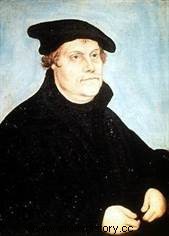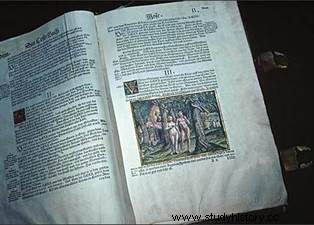 Martin Luther (1483-1546) is a German theologian, at the origin of the Reformation of Christianity which gave birth to the Protestant religion. Having become a priest in 1507, Martin Luther devoted himself to the study of biblical texts and quickly fell into disagreement with the main teachings of the Catholic Church. Rejected by the Catholic Church, he begins the translation of the Bible into German. Thanks to the recent invention of the printing press, the writings of Martin Luther are quickly distributed throughout Europe. When he died in 1546, several Protestant (or Lutheran) churches had been founded in Northern Europe.
Martin Luther (1483-1546) is a German theologian, at the origin of the Reformation of Christianity which gave birth to the Protestant religion. Having become a priest in 1507, Martin Luther devoted himself to the study of biblical texts and quickly fell into disagreement with the main teachings of the Catholic Church. Rejected by the Catholic Church, he begins the translation of the Bible into German. Thanks to the recent invention of the printing press, the writings of Martin Luther are quickly distributed throughout Europe. When he died in 1546, several Protestant (or Lutheran) churches had been founded in Northern Europe.
The context of Martin Luther's reform
The Reformation has its roots in a long crisis of the Catholic Church and European consciousness at the end of the Middle Ages. The decline in the prestige and influence of the papacy, the distancing of populations from a religion that has become too external, the aspiration to rediscover the word of God are all causes which, among others, explain the Reformation, that is, a reaction against deviations from Catholic spirituality and an effort to return to the sources of faith (the Scriptures) and to a more direct relationship with God.
Luther's journey is a good illustration of this period of spiritual ferment:of peasant origin, this priest who entered orders suddenly discovered with indignation the luxury of the papal court on occasion of a trip to Rome. After a painful crisis of conscience, Luther's revolt broke out in 1517, when he made public his "95 theses", mainly directed against indulgences (remission by the Church of the temporal penalty that a sin deserves). Luther considers that it is faith, and not "good works", which alone can lead to Salvation. His theses immediately had a great impact throughout Europe, especially among humanists.
The Foundations of Protestantism
 Faced with the intransigence of Catholic theologians, Luther, whose conceptions were not irreconcilable with the doctrine of the Church, is led to reject all ecclesiastical authority and rely only on the Bible. Excommunicated by the Pope and banished from the Empire by Charles V (1521), he found refuge in Saxony with Frederick the Wise. There, he undertook a German translation of the Bible to allow everyone direct access to the Holy Scriptures (this translation is also the "founding charter" of the German language).
Faced with the intransigence of Catholic theologians, Luther, whose conceptions were not irreconcilable with the doctrine of the Church, is led to reject all ecclesiastical authority and rely only on the Bible. Excommunicated by the Pope and banished from the Empire by Charles V (1521), he found refuge in Saxony with Frederick the Wise. There, he undertook a German translation of the Bible to allow everyone direct access to the Holy Scriptures (this translation is also the "founding charter" of the German language).
His disciples ruled worship:celibacy of priests, abolition of images of saints... Worried about the deviations induced by his own theses, Luther took the side of popular movements Protestant princes to whom he entrusts the direction of the newly created Church. Luther could not prevent the conflict between the Protestant princes and the Catholic Emperor which would lead, by virtue of the principle according to which a prince imposes his religion on his subjects, to the religious fragmentation of Germany, which is still visible today.
Luther's work laid the foundations of Protestantism. The principles set out by the theologian still constitute the essential features of the Protestant Churches today:justification by faith alone, primacy of the Scriptures, direct relationship with God through the Bible and prayer, which implies a lesser importance of the sacraments and church organization. Even during Luther's lifetime, his doctrine was to reach Northern Europe. Gradually, the Protestant Reformation was to snatch from the Catholic Church about a third of Christian Europe (Northern and North-Western Europe).
To go further
- Martin Luther, biography of Matthew Arnold. Fayard, 2017.
- Luther:His Sources, His Thought, His Mark in History, by Marc Lienhard. Labor and fiedes, 2016.
